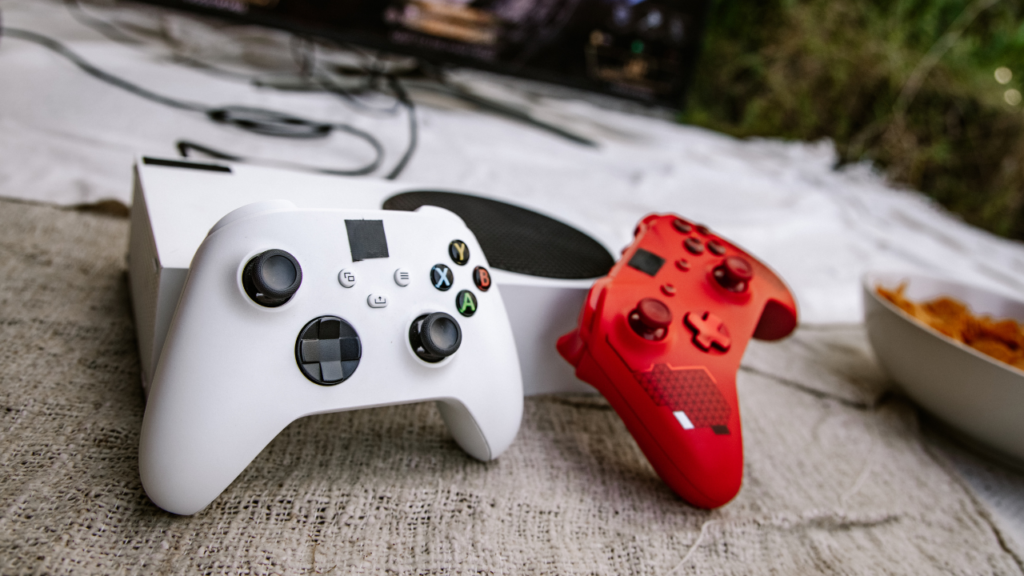In this blog post, we will be discussing Gaming PC Better Than The Console Gaming and the pros and cons of gaming PCs and consoles. With the rise of online gaming and the increasing popularity of video games, many people are faced with the decision of whether to invest in a gaming PC or a console. Both gaming PCs and consoles have their own unique features and capabilities and making the decision of which one to choose can be challenging.
We will be examining the flexibility and upgrade options of gaming PCs, the convenience and user-friendliness of consoles, and the cost and reliability of both platforms. Ultimately, we will conclude by emphasizing that the choice between a gaming PC and a console depends on personal preferences, budget, and the types of games you want to play. We hope that this blog post will provide you with the information you need to make an informed decision about which platform is right for you.
I. Introduction to Gaming PC Better Than The Console Gaming
Briefly introduce the topic of gaming PCs versus consoles.
Gaming PCs and consoles are both popular ways to play video games, but they have different strengths and weaknesses. A gaming PC is a computer that is specifically built or modified for playing video games and has the ability to run games with high-quality graphics and fast frame rates. A console, on the other hand, is a dedicated gaming device that is designed to be connected to a television and is often used for playing games with simpler graphics and lower frame rates. Both gaming PCs and consoles have their own unique features and capabilities and making the decision of which one to choose can be challenging.
II. Flexibility and Upgrade Options
Explain how gaming PCs offer more flexibility and upgrade options.
Gaming PCs offer more flexibility and upgrade options compared to consoles. With a gaming PC, you have the ability to upgrade various components such as the graphics card, processor, memory, and storage. This allows for a more personalized and powerful gaming experience. You can also use a gaming PC for other tasks such as video editing, programming, or even as a workstation.
Upgrading a console, however, is not as easy and in most cases, not possible. Console hardware is sealed and not user-upgradable, meaning you have to buy a new console to get the latest hardware. Additionally, gaming PCs can run a wider variety of games, including PC-exclusive titles, older games, and games that are not available on consoles.
Discuss how this allows for a wider variety of games to be played.
The flexibility and upgrade options of gaming PCs allow for a wider variety of games to be played. Gaming PCs can run a wide range of games, from the latest AAA titles to older games and PC-exclusive titles. This is because gaming PCs can handle more demanding games that require more powerful hardware, such as high-end graphics cards and fast processors.
Additionally, gaming PCs can run games on a wide range of different operating systems, whereas consoles are typically limited to running games on the specific operating system that the console is built on.
Furthermore, gaming PCs can run games that are not available on consoles. For example, some games are developed specifically for the PC and are not available on consoles. Additionally, older games that are not compatible with modern consoles can still be played on a gaming PC.
In summary, the flexibility and upgrade options of gaming PCs allow for a wider variety of games to be played because it has the capability to run games that require more powerful hardware and that are not available on consoles.
III. Convenience and User-Friendliness
Describe how consoles are often more convenient and user-friendly.
Consoles are often more convenient and user-friendly compared to gaming PCs. The setup process for a console is typically much simpler and more streamlined than for a gaming PC. With a console, all you need to do is plug it in, connect it to your television, and start playing. You don’t have to worry about compatibility issues or installing drivers. Additionally, most consoles have a simple and intuitive interface that makes it easy to navigate and find the games you want to play.
Consoles also tend to be more reliable than gaming PCs. Because consoles are designed specifically for gaming and are not used for other tasks, they are less likely to experience problems such as crashes or freezes. Additionally, consoles have a longer lifespan than gaming PCs, and their hardware is optimized for gaming, which means they can run games smoothly for a longer period of time.
In summary, Consoles are often more convenient and user-friendly compared to gaming PCs. They have a simpler and more streamlined setup process and a simple and intuitive interface that makes it easy to navigate and find the games you want to play. Additionally, consoles tend to be more reliable than gaming PCs.
Detail the simpler setup process and streamlined interface of consoles.
The setup process for a console is typically much simpler and more streamlined compared to a gaming PC. With a console, all you need to do is plug it in, connect it to your television, and start playing. There is no need to install drivers, configure settings, or worry about compatibility issues. Once the console is plugged in and connected to the TV, you can start playing immediately.
The interface of consoles is also simple and intuitive. Most consoles have a main menu that displays a list of all the games you own, and it’s easy to navigate. The layout is usually straightforward, and you can usually find what you’re looking for with just a few clicks. Additionally, most consoles come with a controller that is easy to use and understand, making it easy for anyone to start playing.
In summary, the setup process and interface of consoles are simple and streamlined compared to a gaming PC. There is no need to go through the process of installing drivers and configuring settings, the console is ready to use right out of the box. The interface is also simple, intuitive and easy to navigate, making it easy to find and start playing games.
IV. Cost and Reliability

Discuss how consoles tend to be less expensive than gaming PCs.
Consoles tend to be less expensive than gaming PCs. While the initial cost of a console can be higher than that of a gaming PC, over time, the cost of a console is often less. This is because consoles are typically sold at a loss, with the expectation that the company will make money through game sales and online subscriptions. Additionally, the cost of a console is often spread out over time, with new models being released periodically.
On the other hand, the cost of building or buying a gaming PC can be high, especially if you want to play the latest games at the highest settings. Building a high-end gaming PC requires a significant investment in expensive components such as a powerful graphics card, fast processor, and a large amount of memory. Additionally, the cost of a gaming PC can continue to increase as you upgrade components over time.
Furthermore, the cost of games for a console is often less expensive than for a gaming PC, which can add up over time.
In summary, Consoles tend to be less expensive than gaming PCs. The initial cost of a console is typically lower and the cost is spread out over time with new models being released periodically. Additionally, the cost of games for a console is often less expensive than for a gaming PC.
Explain how consoles are often more reliable than gaming PCs.
Consoles are often more reliable than gaming PCs for several reasons.
Firstly, since consoles are designed specifically for gaming and not used for other tasks, they are less likely to experience problems such as crashes or freezes. Additionally, the hardware in consoles is optimized for gaming and the software is streamlined, making it less prone to errors.
Secondly, the lifespan of a console is often longer than that of a gaming PC. Because consoles are built to be used for gaming and not for other tasks, the hardware is not subject to as much wear and tear. Additionally, consoles are often released with new models every few years, whereas the lifespan of a gaming PC can be shorter, requiring more frequent upgrades.
Thirdly, since consoles are sealed and not user-upgradable, it eliminates the potential issues that could arise from user error during upgrading or replacing components.
In summary, Consoles are often more reliable than gaming PCs. They are designed specifically for gaming, optimized for gaming and have a longer lifespan. Additionally, since consoles are sealed and not user-upgradable, it eliminates the potential issues that could arise from user error during upgrading or replacing components.
Comparison Table
| Feature | Gaming PC | Console |
|---|---|---|
| Flexibility and Upgrade options | High | Low |
| Variety of games | High | Medium |
| Convenience and User-friendliness | Low | High |
| Cost | High | Low |
| Reliability | Low | High |
| Power | High | Medium |
| Customization | High | Low |
The above table compares some of the key features of gaming PCs and consoles, including Flexibility and Upgrade options, Variety of games, Convenience and User-friendliness, Cost, Reliability, Power, and Customization. Gaming PCs offer more flexibility and upgrade options, as well as the ability to run a wider variety of games, but they are often more expensive and require regular maintenance. On the other hand, consoles are typically more user-friendly and less expensive, but they have less power, less customization, and a more limited selection of games.

Summarize the main points of the discussion.
In summary, the choice between a gaming PC and a console depends on personal preferences, budget, and the types of games you want to play. Gaming PCs offer more flexibility and upgrade options, as well as the ability to run a wider variety of games. However, consoles are often more convenient and user-friendly, with a simpler setup process and a more streamlined interface.
Additionally, consoles tend to be less expensive and more reliable than gaming PCs. Gaming PCs typically require more powerful hardware and regular upgrading and have a shorter lifespan. On the other hand, consoles are designed specifically for gaming, optimized for gaming, and have a longer lifespan. Additionally, since consoles are sealed and not user-upgradable, it eliminates the potential issues that could arise from user error during upgrading or replacing components
Emphasize that the choice between a gaming PC and a console depends on personal preferences, budget, and the types of games you want to play.
It is important to note that the choice between a gaming PC and a console ultimately depends on the individual’s personal preferences, budget, and the types of games they want to play. A gaming PC typically offers more flexibility and upgrade options, as well as the ability to run a wider variety of games, but it requires a larger upfront investment, regular upgrades, and maintenance.
On the other hand, consoles are often more convenient and user-friendly, with a simpler setup process and a more streamlined interface, but they are typically less powerful, less customizable, and offer a more limited selection of games. It’s important to weigh the pros and cons of each platform and consider how you plan to use it before making a decision.
FAQs
Q: What is better – gaming PC or console gaming?
Ans: It depends on your gaming needs. Gaming PC offers better graphics and more customization, while console gaming is more accessible and user-friendly.
Q: Is gaming PC more expensive than console gaming?
Ans: Yes, gaming PC can be expensive, but it also offers better graphics and more customization options.
Q: Can I upgrade my gaming PC?
Ans: Yes, you can upgrade your gaming PC over time to stay current with the latest games and technology.
Q: Are console games cheaper than PC games?
Ans: Console games are usually cheaper than PC games.
Q: Can I play exclusive titles on gaming PC?
Ans: No, exclusive titles are only available on console gaming.
Q: Do I need technical knowledge to build a gaming PC?
Ans: Yes, building a gaming PC requires technical knowledge.
Q: Do I need to upgrade my console regularly?
Ans: No, you do not need to upgrade your console regularly.
Q: Can I customize my console?
Ans: No, console gaming offers limited customization options.
Q: Is console gaming more user-friendly than gaming PC?
Ans: Yes, console gaming is more user-friendly than gaming PC.
Q: Which gaming platform should I choose?
Ans: It depends on your gaming needs and preferences.
Conclusion
In conclusion, this blog post has discussed the pros and cons of gaming PCs and consoles. It has highlighted the flexibility and upgrade options of gaming PCs, the convenience and user-friendliness of consoles, and the cost and reliability of both platforms. Ultimately, it has emphasized that the choice between a gaming PC and a console depends on personal preferences, budget, and the types of games you want to play.
In conclusion, both gaming PCs and consoles have their own unique features and capabilities that make them suitable for different types of gamers. Gaming PCs offer more flexibility and upgrade options, as well as the ability to run a wider variety of games, but they are often more expensive and require regular maintenance. On the other hand, consoles are typically more user-friendly and less expensive, but they have less power, less customization, and a more limited selection of games.

